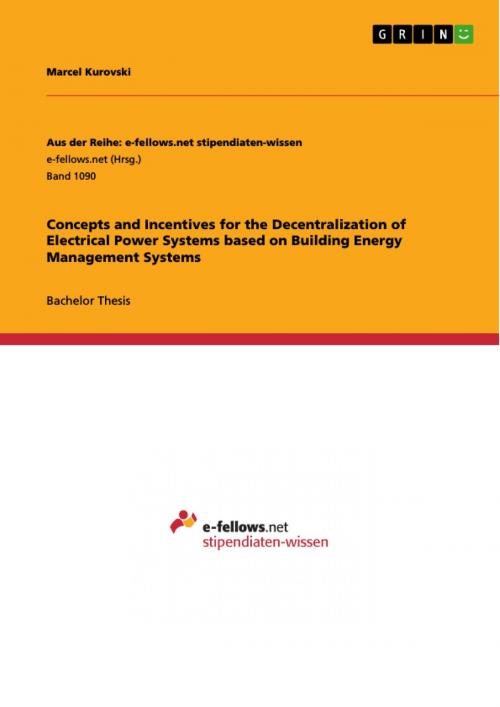Concepts and Incentives for the Decentralization of Electrical Power Systems based on Building Energy Management Systems
Nonfiction, Science & Nature, Technology, Engineering| Author: | Marcel Kurovski | ISBN: | 9783656873600 |
| Publisher: | GRIN Publishing | Publication: | January 12, 2015 |
| Imprint: | GRIN Publishing | Language: | English |
| Author: | Marcel Kurovski |
| ISBN: | 9783656873600 |
| Publisher: | GRIN Publishing |
| Publication: | January 12, 2015 |
| Imprint: | GRIN Publishing |
| Language: | English |
Bachelor Thesis from the year 2013 in the subject Engineering - Industrial Engineering and Management, grade: 1,3, Karlsruhe Institute of Technology (KIT) (Institut für Angewandte Informatik und Formale Beschreibungsverfahren (AIFB)), language: English, abstract: Electrical power systems face a paradigm shift: the change from supply-side orientation to demand-side concentration. This shift is promoted by an increasing share of renewable energy generation that is predominantly supplied on a local scale. Thus, electric power grids designed to serve unidirectional top-down energy distribution have to cope with increasing bidirectional power flows as a result from intermittent renewable energy supply. This compromises grid stability. Costs of conventional energy supply and energy related costs, resource depletion, climate change and dependence as well as supply security and reliability present further challenges in electrical power systems. Together they drive the engagement towards new technologies and approaches. The thesis examines Building Energy Management Systems (BEMS) and Micro Grids as well as their combination and the opportunity to conduct Demand Side Management (DSM) in order to integrate renewables, increase grid stability and raise independence. BEMS are systems that undertake energy management, controlling and prediction for loads, generators and storages of specific buildings. Micro grids interconnect distributed generation and storage devices. Both concepts incorporate considerable integration of Information and Communication Technology (ICT) which adds information flows to power flows. By aggregation of capacities, complexity reduction and adding flexibility to the local scale this combination has significant potential to tackle the challenges of the ongoing paradigm shift. The potential of buildings together with stakeholder interests and incentives to engage and propagate the application of these concepts as well as collaboration opportunities will be focus of this work. Technologies and enabled approaches can raise energy autonomy of buildings and networks of buildings, increase local reliability and security of energy supply but also support the utility grid by offering grid-supporting services. Therefore different building sectors will be assessed in this work and give a framework for the sector-specific evaluation of incentives. Monetary incentives through supply and trade of flexibility as well as reduction of energy and related costs or generation of revenues through power and ancillary services provision provide the most attracting incentives. Flexible loads and generators thus offer high potential for rewards. Markets and participation requirements will be outlined in this thesis.
Bachelor Thesis from the year 2013 in the subject Engineering - Industrial Engineering and Management, grade: 1,3, Karlsruhe Institute of Technology (KIT) (Institut für Angewandte Informatik und Formale Beschreibungsverfahren (AIFB)), language: English, abstract: Electrical power systems face a paradigm shift: the change from supply-side orientation to demand-side concentration. This shift is promoted by an increasing share of renewable energy generation that is predominantly supplied on a local scale. Thus, electric power grids designed to serve unidirectional top-down energy distribution have to cope with increasing bidirectional power flows as a result from intermittent renewable energy supply. This compromises grid stability. Costs of conventional energy supply and energy related costs, resource depletion, climate change and dependence as well as supply security and reliability present further challenges in electrical power systems. Together they drive the engagement towards new technologies and approaches. The thesis examines Building Energy Management Systems (BEMS) and Micro Grids as well as their combination and the opportunity to conduct Demand Side Management (DSM) in order to integrate renewables, increase grid stability and raise independence. BEMS are systems that undertake energy management, controlling and prediction for loads, generators and storages of specific buildings. Micro grids interconnect distributed generation and storage devices. Both concepts incorporate considerable integration of Information and Communication Technology (ICT) which adds information flows to power flows. By aggregation of capacities, complexity reduction and adding flexibility to the local scale this combination has significant potential to tackle the challenges of the ongoing paradigm shift. The potential of buildings together with stakeholder interests and incentives to engage and propagate the application of these concepts as well as collaboration opportunities will be focus of this work. Technologies and enabled approaches can raise energy autonomy of buildings and networks of buildings, increase local reliability and security of energy supply but also support the utility grid by offering grid-supporting services. Therefore different building sectors will be assessed in this work and give a framework for the sector-specific evaluation of incentives. Monetary incentives through supply and trade of flexibility as well as reduction of energy and related costs or generation of revenues through power and ancillary services provision provide the most attracting incentives. Flexible loads and generators thus offer high potential for rewards. Markets and participation requirements will be outlined in this thesis.















